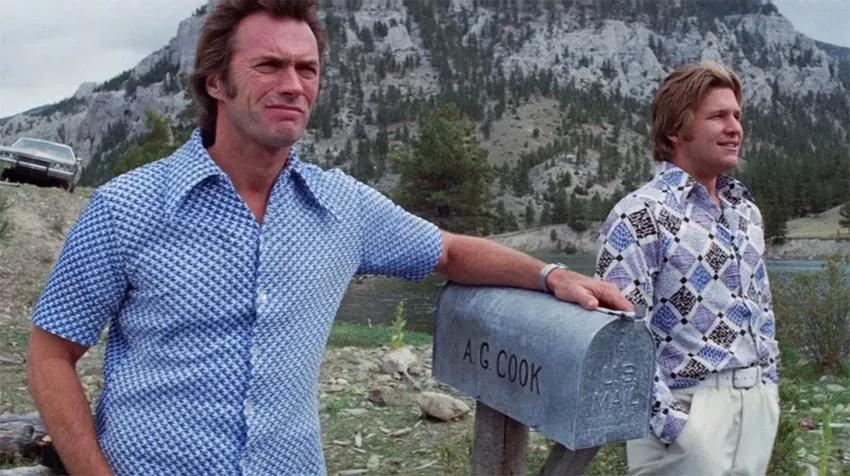Thunderbolt and Lightfoot a quirky homoerotic heist thriller that's defiantly stood the test of time
The first time I watched 1974's Thunderbolt and Lightfoot in the early 1980s I had no idea what I was in for. What did I know? It starred the Man with No Name, Clint Eastwood. It had Jeff Bridges, the guy who disappeared into a video game and became a digitized hero in TRON. It was the first film directed by Academy Award winner Michael Cimino (The Deer Hunter), currently on the outs in Hollywood due to the box office crash and burn of the epic Western Heaven's Gate. Mostly I knew my dad loved it. All of that was more than enough for me to give the flick a chance when I snatched the VHS tape off the shelf from the downtown Spokane library.
What did I get? An incredibly strange buddy-action-heist-comedy that concluded in spectacular tragedy, a cross-dressing Bridges, and what I could only surmise was an unspoken romance between its two stereotypically masculine leads. The homoerotic subtext was so obvious, I could only surmise that Cimino had purposefully put it there, and I was shocked my conservative father had never noticed it. But I did. The drama's final scenes were so hauntingly devastating that I had to retreat to my bedroom so my parents wouldn't see me cry.
The film more or less begins with Eastwood laying low by impersonating a small-town Montana preacher and escaping an assassination attempt by a slimy nobody while he's in the middle of a sermon. That's quickly followed up by Bridges' motor-mouthed car thief literally running over the killer and then offering the fleeing padre a lift. The former turns out to be a well-known bank robber referred to only as "Thunderbolt," while the young hot-rodder goes by the moniker "Lightfoot." In the time it takes a Mustang to go from zero to 60, the pair become fast friends.
In a series of events that makes textbook movie logic but in the real world would be unbelievably goofy, the dead guy trying to murder Thunderbolt was part of his former gang, and the two remaining members (the perfectly cast George Kennedy and Geoffrey Lewis) are as equally homicidally angry. Somehow, not only are the pair convinced to let bygones be bygones but they also get convinced to redo the exact same heist they pulled years prior, right down to the 20mm cannon that gave Thunderbolt his nickname. Lightfoot enthusiastically goes along for the ride.
It's a quirky film. Eastwood has rarely been better, his performance a subtle master class in reactive physicality and determinedly expressive facial gymnastics. But it is Bridges, in one of his finest early roles, who steals the show. This was the second of his seven (as of now) Academy Award nominations, and if he hadn't been facing down Robert De Niro's iconic work in The Godfather Part II, he would likely have won the Oscar. Bridges is funny, pathetic, heroic, sympathetic, selfless, and proudly arrogant as Lightfoot, bouncing across the screen with such energetic euphoria that I couldn't take my eyes off of him. All these years later, I still can't. His fearlessness is infectious.
"Bromance" is a 21st-century term for cinematic male friendships, but it easily could have been coined during the 1970s if anyone had been paying attention (several titles come to mind, including Elaine May's Mikey & Nicky, Richard Rush's Freebie and the Bean, and Arthur Hiller's The In-Laws). But Cimino, whether intentionally or not, appears to take things a step or two further. There is a striking eroticism to Eastwood and Bridges' interaction, and the heat they generate is palpable. It all builds to a climactic moment of unexpected heartbreak that's positively earth-shattering, with Thunderbolt stoically holding back tears as he drives into the unknown with – spoiler alert! – a lifeless Lightfoot sitting in the passenger seat.
Eastwood has always been a perplexing risk-taker. He's filled many of his films – both as an actor and as a director – with groundbreaking depictions of race, gender, and sexuality that pushed taboos and busted the conventions of their time. But he's also utilized egregious stereotypes and centered examples of sexist excess that are decidedly unsavory under the best of circumstances, unforgivably rancid at their worst. Heck, he followed up this film with one of the more blatantly homophobic endeavors of his entire career, 1975's The Eiger Sanction, whose depictions of homosexuality have aged so poorly that the otherwise exhilarating mountain-climbing thriller has sadly (and infuriatingly) become almost impossible to watch.
The counterpoint is that Eastwood has never been one to play it safe, and by allowing Cimino the freedom to make this film his own, it gave the actor one of the more daringly emasculating roles of his career. This, along with his work in Play Misty for Me, The Beguiled (both 1971), and High Plains Drifter (1973), two of which he directed, showed how willing the screen icon was to shatter his movie star image. While Thunderbolt and Lightfoot never openly express their affection for one another, it's clear with how one gazes possessively at the other (and vice-versa) just how mutual their silent attraction is.
Even if you leave all that at the door and choose not to analyze the subtext, Thunderbolt and Lightfoot remains a major achievement for Eastwood, Bridges, and Cimino. It deserves to be more than a cult curiosity. It has laughs. It has imagination. It has real drama, hard-hitting thrills, and several unexpected twists that make anticipating what is going to happen when delightfully difficult. If that's not the very definition of "unforgettable," I'm not sure what is.


